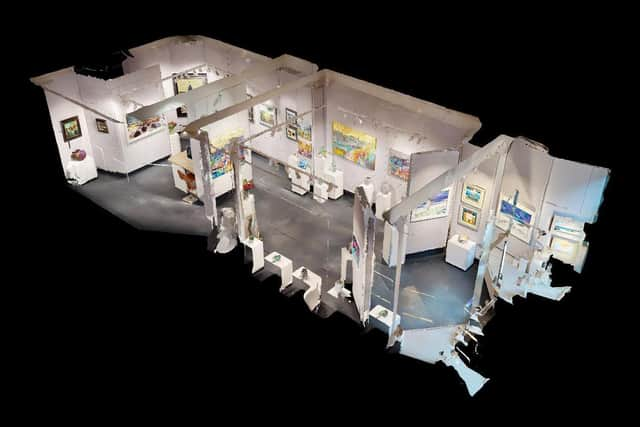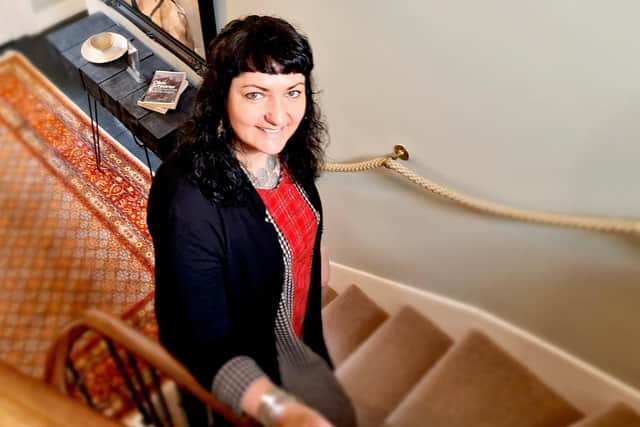Harnessing the digital world to protect against more real-world rules - comment


Now that almost all businesses have been able to reopen premises, Scotland’s recovery from the economic effects of the Covid-19 pandemic is on its way.
A recent KPMG report forecast that Scotland’s gross domestic product will grow by 6.4 per cent this year. But it also said the pace of our recovery is linked to how quickly we move along the Scottish Government's unlocking roadmap. So it’s vulnerable to the third wave of Covid-19 being driven by the Delta variant.
Advertisement
Hide AdAdvertisement
Hide AdOn June 4, Ewan Macdonald-Russell, head of policy and external affairs at the Scottish Retail Consortium, said: “Reopening alone has yet to prove a magic bullet for our hard-pressed retail industry… which remains unable to trade at capacity due to physical distancing and caps on the number of customers in stores.


“Without a rebound in footfall and increased demand, many retailers will struggle to make ends meet, placing a question mark over the viability of stores and jobs and the vitality of our retail destinations.”
‘Think more creatively’
Mr Macdonald-Russell called on the Scottish Government to “think more creatively… about how they might reignite consumer confidence, entice people back into our retail destinations, and kick-start demand.”
While government can help stimulate demand, it’s down to each business to market its offer effectively and operate in a way that still works during physical trading restrictions, which may have to return.
Advertisement
Hide AdAdvertisement
Hide AdClients of ours have created more restrictions-resilient “clicks and mortar” business models using the Matterport 360 virtual tours made by us to showcase their spaces and products. As a result they kept trading during Scotland’s second lockdown and are enjoying rebounding sales since.
Customers of Morningside Gallery in Edinburgh are using its tours to virtually walk through its space, with the advantage of being able to click information boxes to find out more about a piece. That’s prompting them to buy them straightaway or ask about doing so, rather than requesting more information first.
Director Eileadh Swan says her tours changed how she conducts business – half her sales are now online, including from overseas. She believes 360 tours can help other galleries and shops “sell” the experience of visiting the space, too, when that’s possible.
Confidence
Leigh Sparks, professor of retail studies at the Institute for Retail Studies at the University of Stirling, says: “Confidence for retailers and consumers will take some time to build, develop and consolidate. Anything that adds engagement is helpful, as is giving people confidence in going somewhere new and seeing how it works.
Advertisement
Hide AdAdvertisement
Hide Ad“Online sales have grown but physical stores still have a vital place. In-person retail will still play a part because people like going out and shopping. Independents are realising both digital and physical can work for them too.”
360 tours for the Newhall Estate wedding and event venue with self-catering accommodation in Midlothian says it gave couples enough information and thereby confidence to make bookings during the second lockdown, despite not being able to visit it in person.
Director Jak Kennedy says this was “a crucial element helping to keep us afloat during the pandemic”. It’s now fully booked for weddings this year and next.
Since reopening, the tours allow couples to visit virtually when weddings mean they can’t be on site, as well as saving them and the venue time – they no longer have to make multiple visits to check layouts and measurements as they’re available online.
Conversion jump
Advertisement
Hide AdAdvertisement
Hide AdNewhall Estate has also seen a jump in the conversion rate of visits leading to bookings – because only those who already like the space in a virtual visit will come for a final check before booking.
Jak says: “This puts us in a much better position if restrictions have to be tightened again. If other venues took this on, it would 100 per cent improve bookings.”
Travel, tourism and hospitality marketing consultant Sarah Brown, director of Mud Marketing, says: “360 tours are already playing a vital role for tourism and hospitality, and will continue to whatever happens. I've been using them since I commissioned one for Crieff Hydro in 2013.
"360 tours in hospitality allow website visitors to gain more in-depth knowledge – to assist with purchasing decisions. Because 360 tours such as Matterport are becoming a normal tool due to estate agents using them, visitors understand and interact well with them.
Advertisement
Hide AdAdvertisement
Hide Ad"My client Glamis Castle commissioned a Matterport tour in lockdown to create income when the castle was closed. It continues to sell its unique qualities to those who can't travel yet, so is a way for us to continue to tap into the European and American markets.”
Arts and culture venues only resumed in-person visiting on April 26. But they can turn to the £1 million Creative Digital Initiative announced by the Scottish Government on March 23 to develop their digital capabilities.
New revenue streams
Celia Joicey, director of Edinburgh’s Dovecot Studios, says its tours allowed the celebrated venue to earn essential income during the second lockdown through new ways of generating revenue, including ticketed virtual Tapestry Studio tours and exhibition visits. Those have carried on and could support it through any new physical closure if unlocking rolls back.
Well-planned and executed 360 virtual tours can help others in these sectors and more to bounce back quicker. If physical trading restrictions return, 360 tours can help revenue continue online for many.
Advertisement
Hide AdAdvertisement
Hide AdThat’s the key – building a more robust way of marketing and trading that works online as well as offline. If more of Scotland’s businesses can do that, our recovery can be quicker and more Covid-restrictions-resilient, whatever happens.
A message from the Editor:
Thank you for reading this article. We're more reliant on your support than ever as the shift in consumer habits brought about by coronavirus impacts our advertisers.
If you haven't already, please consider supporting our trusted, fact-checked journalism by taking out a digital subscription.
Comment Guidelines
National World encourages reader discussion on our stories. User feedback, insights and back-and-forth exchanges add a rich layer of context to reporting. Please review our Community Guidelines before commenting.